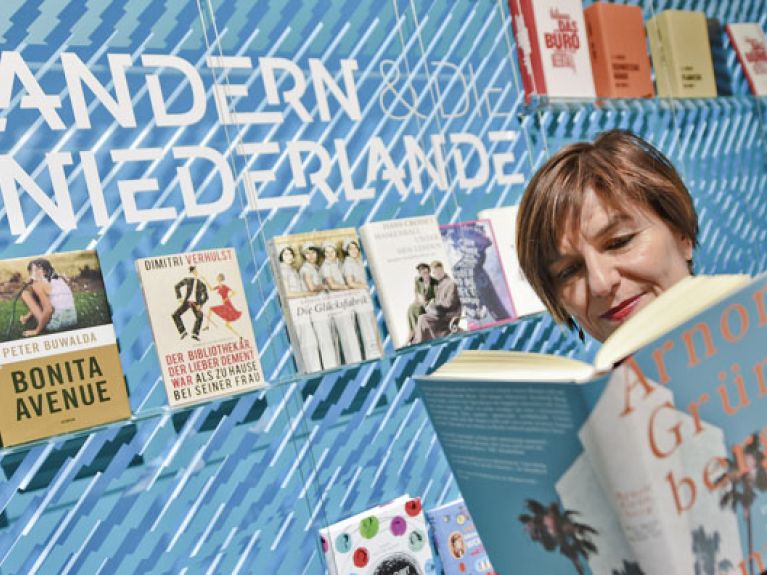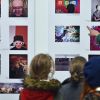Poetic encounter between neighbours
Dutch-language literature is popular worldwide. In 2016, the Netherlands and Flanders are presenting their world of literature as Guest of Honour at the Frankfurt Book Fair.

Sometimes the world-famous book fair in Frankfurt am Main works like a literary incubator, with the respective Guest of Honour in particular going on to attain literary stardom. In 1993, two regions shared the limelight and attracted huge attention at the fair: the Dutch-speaking Belgian region of Flanders and the Netherlands.
After the two regions’ guest appearance at the fair, Dutch-language literature experienced a major boom, not only in Germany but across the globe. Writers like Hugo Claus, Harry Mulisch and Cees Nooteboom became world-famous authors and contenders for the Nobel Prize in Literature. In the following years, Flanders and the Netherlands were sometimes even said to be producing Europe’s most vibrant literature. Germany has since become the country publishing the most translations of Dutch-language literature worldwide.
Two factors played a crucial role in the Frankfurt Book Fair’s decision to invite Flanders and the Netherlands to appear as Guest of Honour again in October 2016, in a rerun of their 1993 guest spot. The first appearance of the two regions and countries with a shared language and culture was one of the most successful in the book fair’s history. What’s more, while Germany and its neighbours enjoy wide-ranging and constantly evolving relations, not least in the field of culture and literature, there is always a need for new impetus and new efforts to present the richness of this language region and the complexity of the ties between the six million Flemish and the 15 million Dutch – indeed between Belgium and the Netherlands overall.
A book fair like that in Frankfurt, which enjoys international status and radiates around the world, may be able to build robust bridges of understanding, even in the two countries sharing the guest spot. Nearly 400 new books from and about Flanders and the Netherlands are due to be published to coincide with the book fair. In 2016, 132 German literary publishers have at least one book in their programme that is translated from Dutch.
Bart Moeyaert, artistic director of the Flanders & the Netherlands Guest of Honour programme, plans to do much more than just send 70 writers from Flanders and the Netherlands to Frankfurt in October 2016 to read from and present their books. Moeyaert aims not only to show how the Flemish and the Dutch differ despite their shared language and how Belgium’s French-speaking region of Wallonia fits into the overall equation, but also what these nations have in common with Germany. That’s why “Dit is wat we delen” (This is what we share) was chosen the programme’s motto. Take, for example, the sea – the North Sea. “But just having the North Sea as a theme would be stupid, of course, because it’s a tourist image. But the sea as a literary metaphor is wonderful, I think, because it’s both poetic and political – look at the refugees arriving by sea – and it’s something that’s not always gentle and beautiful.”
New Wave is the name of a special section of the cultural programme of the 2016 Frankfurt Book Fair’s Guest of Honour. It includes theatre, visual art, architecture, photography and film and thereby provides a platform for participants from a wide variety of genres. Even so, the focus will naturally be on literature – from fiction to non-fiction to children’s and young adult literature to graphic novels – with books and readings by Cees Nooteboom, Connie Palmen, Geert Mak, Frank Westerman, Maarten ’t Haart, Margriet de Moor, Arnon Grünberg and Leon de Winter, to mention just a few of the more prominent names.
There are some parallels to German-language literature. For example, Flemish and Dutch authors with an immigrant background, such as Kader Abdolah, Fikry El Azzouzi and Tommy Wieringa, are increasingly telling stories of migration and integration. The most impressive feature of Dutch-language literature is its diversity and multifaceted nature. And in terms of literary quality, that can only be a boon. ▪

